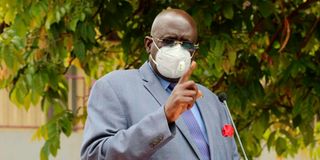Crucial place of research in Kenya

Education Cabinet Secretary George Magoha who recently challenged Kenyan universities to do research that’s specific to Kenyan problems.
The Education Cabinet secretary recently challenged Kenyan universities to do research that’s specific to Kenyan problems. Some questions were cited, such as why there is shortage of fish in a lake with a freshwater ecosystem, what causes unavailability of water, why malaria cannot be stopped, and more. One key follow-up to this statement is the recognition that research is happening in Kenyan educational institutes, and has been happening for a long time.
By foregrounding universities, an unnecessary hierarchy is created between them and other tertiary institutions, such as polytechnics, trade schools and colleges, whose interventions are just as important. It is not compulsory that one goes to any formal school to engage in research, experimentation and innovation. Many Kenyans in their homes and workshops have invested their personal resources to develop gadgets that make life easier.
Research possibilities
While technical research is limited by access to education and certain kinds of expertise, alongside access to specific instruments, laboratories and equipment, there is still a universe of research possibilities everywhere else in life – in the sciences, arts, humanities and elsewhere. Kenyans have been actively contributing in both lay and professional capacities to this growing body of knowledge.
The issue, therefore, has never been lack of research, or even lack of innovation. It may, perhaps, be more productive to ask why the kind of research the CS is talking about is not more commonplace. Is our research environment an enabling one? There is the issue of funding. While everyone benefits from research, the process is not cheap. It has to be planned and monitored. Data has to be collected.
Experiments have to be done. Lack of adequate administration and support can be the reason a good research project fails. If funding and enabling policies and regulations are not already in place, it should not be too challenging to set up special task forces to dialogue with the public and stakeholders and get this ball rolling. Kenya is a hotbed of good ideas, and the incredible successes of its workers here and all over the world is testament to this.
Outcomes of research
A second and more sobering consideration is what happens to the outcomes of research and innovation in Kenya. In countries where they are aptly rewarded, and where there are easier paths to funding and markets, research almost incentivises itself because people see how useful it can be.
However, there are many discouraged innovators whose inventions have been soiled with failed promises of government support. The doors of opportunities remain firmly shut, and any chances of growth are halted prematurely. It’s the reason Kenyans keep good ideas to themselves, preferring to work only at what is immediately useful to them.
Research at all levels is key to the welfare of Kenyans and to many existing solutions. The statement by the CS reflects this. However, more has to be done to enable and reward the work that thousands of Kenyan researchers are already doing.
The writer is a policy analyst. [email protected]





